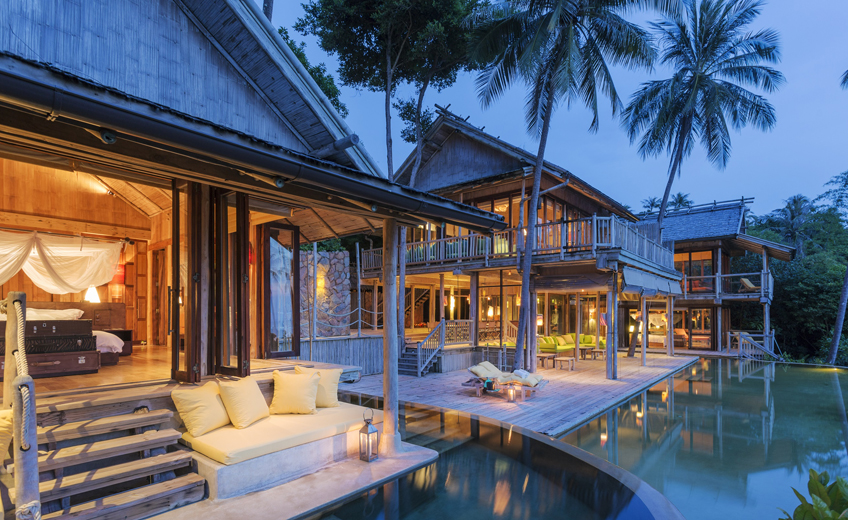on the pristine shores of Koh Kood, one of Thailand’s largest but least densely populated islands, stands Soneva Kiri. This modern resort blends into the wild jungle at its borders, but its eco-friendly style is more than mere aesthetics. To understand Sonvea Kiri’s holistic approach to sustainability requires taking a brief trip across the Indian Ocean and a more challenging journey across time to the origins of Soneva Resorts.
In the 1980s the resort’s founder and CEO, Sonu Shivdasani, was studying at Oxford University and came to the Maldives on holiday. He fell in love with the island nation, but was disappointed by the quality of the resorts and their disregard for the environment. In 1991, after several unsuccessful attempts, Sonu secured the island that is now home to Soneva Fushi, the Maldives’ first five-star resort, which he founded with his wife Eva in 1995. Then they built spectacular Soneva Kiri on the unspoilt Thai island of Koh Kood in 2009.
The couple had a different take on luxury; they call it “intelligent luxury”. In the minds of many, luxury is synonymous with a stable of premium labels, but real luxury is experiential. It’s an escape from the ordinary into the extraordinary. Many of us live in crowded cities, so the all-consuming calm that a pampered retreat in nature provides is a more meaningful luxury because it is so rare. Experiences like Treepod dining, perched above the waters of the Gulf of Thailand, or an Ayurvedic treatment at the spa —these are the types of experiences that are treasured in memory.
While luxury comes with a price tag, Sonu and Eva don’t want Mother Nature to pay it. Soneva adheres to SLOW LIFE — Sustainable-Local- Organic-Wellness-Learning-Inspiring-Fun- Experiences. These values run at the core of the resorts, from the materials used in construction and management of waste, to community outreach and sustainably sourced menus.
The Soneva Kiri itself is made up of 36 pool villas that range from one to six bedrooms in size. Their designs blend with the jungle surrounding the resort. The spacious interiors are intricately crafted from sustainable materials.
The resort also features many ways to relax. One of the most unique is Cinema Paradiso, an overwater outdoor theatre that offers screenings of classic films four nights a week and private screenings the other three nights. Soneva Kiri also features the world-class spa. The therapists tailor treatments to fit guests’ needs to ensure they leave revitalised.
The property offers plenty to discover. An observatory features guest astronomers who take guests on a tour of the solar system. At Eco Centro, staff transform waste into wealth by taking rubbish like styrofoam and turning it into insulation or kickboards rather than leaving it in a landfill. Kids can escape to the Children’s Den, which soars above the trees taking the form of a manta ray. Instructors in the den give lessons on painting, Thai musical
instruments and other visual arts and turn play into a form of enrichment.

For the gourmand, the diverse and sustainable dishes will leave you looking for ways to squeeze in extra meals. Highlights include no-menu Thai cuisine at Benz, situated among the mangroves at the base of a waterfall. The View prepares locally sourced ingredients in a Western style and the menu is regularly updated with the seasons. The menus carry sustainability ratings of the products and suppliers. Chefs speak to the guests about how the ingredients are sourced and people have shown a genuine interest. Soneva Kiri grows over five tonnes of herbs and vegetables a year and is now sourcing its cheeses locally from Thailand. The chefs are passionate about Soneva’s values and continue to find innovative and delicious ways of bringing sustainability to the plate.

Despite Soneva’s eco-conscious approach to luxury, because so many of the guests fly vast distances to arrive at the resort, Soneva works to actively offset its carbon footprint. They’ve created the Slowlife Foundation to get involved in local communities and help build a sustainable future. In Thailand, the foundation has planted over half a million trees as part of the Soneva Forest Restoration programme, while in Darfur and Myanmar they’ve
helped over 200,000 families by providing environmentally friendly stoves for cooking. And in India they’ve built wind turbines for a sustainable source of clean electricity.
Soneva is a different kind of resort, placing care in the local community, the environment and for its guests. Appreciation for the environment at Soneva Kiri is tangible in every element of the resort and helps create those rare moments where you’re able to appreciate the slow life.














































































































































































































































































































































































































































































































































































































































































































































































































